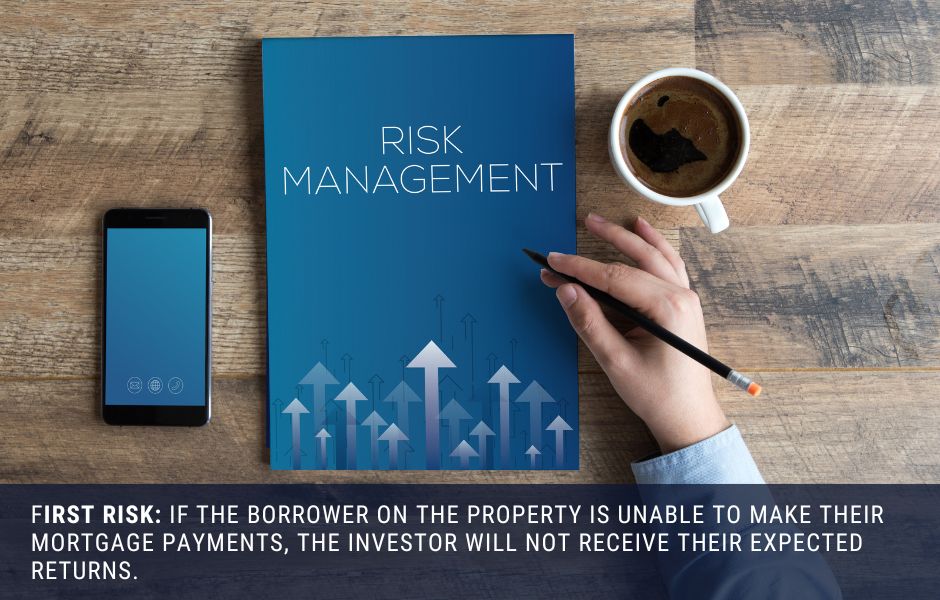Is Note Investing Risky?
Investor Bonus: See Performing Mortgage Notes For Sale Every Thursday
Note Investing can be a great way to earn passive income from real estate, but as with any investment, there are risks to consider. In this article you'll learn about some of biggest risks facing mortgage note investors in 2023

David Garner
Is Mortgage Note Investing Risky?
Mortgage notes are a popular investment opportunity for many individuals looking to diversify their portfolios. These notes represent the debt owed on a property and can provide steady returns to investors.
However, investing in mortgage notes is not without its risks, and it is important to be aware of these risks before making any investment decisions.
First, here is an itemized list of the top 9 risks to consider when considering an investment in mortgage notes:
- Default risk: If the borrower is unable to make their mortgage payments, the investor will not receive their expected returns. In the event of a default, the investor may need to foreclose on the property to recoup their investment.
- Fraud risk: Some unscrupulous individuals may attempt to sell fraudulent mortgage notes to unsuspecting investors. These notes may not actually represent the debt owed on a property or may be based on a property that does not exist.
- Due diligence risk: Investing in mortgage notes requires a significant amount of due diligence on the part of the investor. This includes researching the property and the borrower, as well as evaluating the terms of the note. Investors who fail to conduct proper due diligence may invest in notes that are not worth the risk, leading to significant losses.
- Interest rate risk: Changes in interest rates can impact the value of the mortgage note, leading to reduced or increased returns for the investor.
- Capital risk: Investing in mortgage notes requires a significant amount of capital upfront, which can limit accessibility to the investment strategy for many individuals.
- Market risk: The overall housing market can impact the value and performance of mortgage notes, leading to reduced or increased returns for the investor.
- Legal risk: Investing in mortgage notes can also come with legal risks, as laws and regulations surrounding mortgage note investing can vary by state and country.
- Liquidity risk: Mortgage notes may be illiquid investments, meaning they cannot be easily sold or converted to cash, which can limit an investor’s ability to manage their portfolio.
- Counterparty risk: Investors are also exposed to counterparty risk when investing in mortgage notes. This means that the performance of the investment is dependent on the actions and ability of the borrower and other parties involved in the mortgage note.
- Concentration risk: Investing in mortgage notes can also lead to concentration risk, as an investor’s portfolio may become heavily weighted towards a single asset class or investment strategy. This can increase the overall risk of the portfolio.
Now, let’s get into a little more detail on some of these risks…
Default Risk
One of the biggest risks associated with investing in mortgage notes is the potential for default.
If the borrower on the property is unable to make their mortgage payments, the investor will not receive their expected returns. In the event of a default, the investor may need to foreclose on the property to recoup their investment.
Foreclosing on a property can be a lengthy and costly process, which can significantly reduce the potential returns on the investment.
That is why non-performing notes are often available for purchase at a significant discount to face value as it is considered bad debt.
Fraud Risk

Another risk associated with investing in mortgage notes is the potential for fraud.
Some unscrupulous individuals may attempt to sell fraudulent mortgage notes to unsuspecting investors. These notes may not actually represent the debt owed on a property or may be based on a property that does not exist.
Investors who fall victim to these scams can lose all of their investment capital and may have little recourse for recovery.
More often than not, you will find a ton of ‘note brokers’ swirling around the interest offering amazing deals on mortgage notes. In reality, these notes are usually trash. They are the notes the seller does not want to keep themselves after buying a large pool of notes, and they are often ,marked up in price by many hundreds of a percent.
Due Diligence Risk

Investing in mortgage notes also requires a significant amount of due diligence on the part of the investor.
This includes researching the property and the borrower, as well as evaluating the terms of the note. Investors who fail to conduct proper due diligence may invest in notes that are not worth the risk, leading to significant losses.
I would encourage anyone to take on board some quality mortgage note investing training, preferable NOT with a ‘broker’ that will then try and sell you (or partner with you) on a note.
Interest Rate Risk
In addition to the risks associated with default and fraud, investing in real estate notes can also be impacted by changes in interest rates.
If interest rates rise, the value of the mortgage note can decrease, leading to reduced returns for the investor. Conversely, if interest rates fall, the value of the mortgage note may increase, leading to higher returns for the investor.
This makes investing in mortgage notes a somewhat unpredictable investment strategy, as changes in interest rates can have a significant impact on the potential returns.
Capital Risk
Investing in mortgage notes also requires a significant amount of capital upfront.
In many cases, investors must have a significant amount of cash on hand to purchase the note, as well as the resources to manage the investment. This can limit the accessibility of mortgage note investing to many individuals who may not have the necessary capital or resources.

In order to mitigate some of the risks associated with investing in mortgage notes, it is important to work with reputable and experienced brokers or investment firms.
These professionals can help investors evaluate potential investments and can provide guidance throughout the investment process. Additionally, investors should conduct their own due diligence and research before making any investment decisions.
There are also a ton of companies that have a specific purposes of helping note investor complete various parts of the due diligence process, such as title work, collateral file review, real estate valuations and borrower assessments.
Investing in mortgage notes can be a lucrative investment strategy for those who are willing to take on the risks associated with this type of investment. However, it is important to be aware of the potential risks and to conduct proper due diligence before investing any capital. By working with experienced professionals and conducting proper research, investors can increase their chances of success in this investment strategy.
[/fusion_text]


